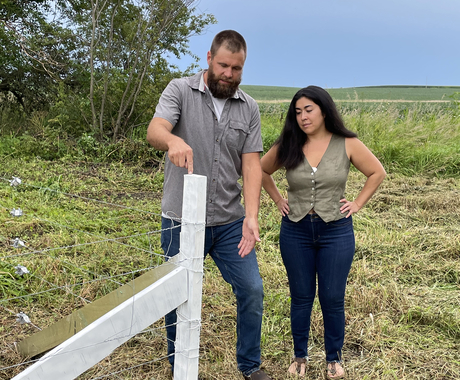Mike Wutulski may not be a farmer, but he has found creative ways to maintain the legacy of his family’s farm through the Conservation Reserve Program (CRP) as well as the CRP–Transition Incentives Program (CRP-TIP).
Mike’s grandfather bought their 80-acre Gage County farm in 1933. Over the years, the operation grew to include wheat, milo, and corn, as well as cattle and hogs. In 1995, Mike’s dad retired from farming, so Mike and his siblings decided to enroll the land in CRP. Administered by the U.S. Department of Agriculture’s Farm Service Agency (FSA), CRP provides payments to farmers for acres removed from production and seeded to native grasses that capture carbon, improve water quality, and create wildlife habitat.
As the end of their CRP contract approached, however, Mike’s family needed to make a decision on how to move forward. With off-farm jobs, neither Mike nor his siblings were prepared to farm the land themselves. Should they sell it? Should they lease the ground and return it to production? Mike took the opportunity to discuss options with their county FSA staff who recommended CRP-TIP as a way to increase revenue for the family farm and provide an eligible farmer with land to rent.
CRP-TIP, which is also administered by FSA, provides two years of additional CRP payments to a landowner who sells or long-term leases their expiring CRP acres to a beginning farmer or rancher. It provides an opportunity to offer land access to young or new producers who might otherwise face barriers acquiring acres. Upon its return to production, the land must be farmed or ranched according to an approved conservation plan.
According to Mike, the staff at his FSA office walked him through the entire process, including program paperwork.
“We simply found a renter that qualified for the program and signed papers. The FSA office was easy to work with and helpful throughout the process,” he said.
As it happens, Mike didn’t need to look far for a renter. Spencer Hegermeier grew up down the road from the Wutulski farm, and Mike knew him from their local church. When Spencer decided to pursue row crop farming, CRP-TIP emerged as a way the Wutulski family could help Spencer get started. The rented acres are now producing corn and soybeans and contributing to the financial sustainability of Spencer’s operation.
Mike is pleased with CRP-TIP and has been happy to help a beginning producer get started.
“We have additional land currently in CRP that will expire in 2025. We will work to add this tract to the TIP program also,” he said.
To learn more about the CRP - Transition Incentives Program, join one of our upcoming informational webinars on Jan. 10 or Jan. 14. See our event listing for more information.





